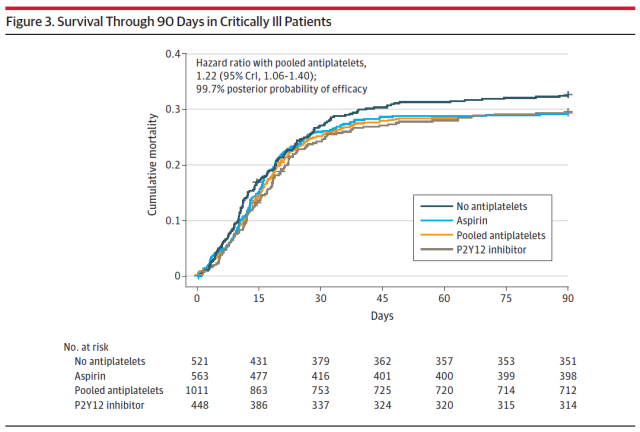Aspirin can improve the survival rate of patients with severe COVID-19
- Normal Liver Cells Found to Promote Cancer Metastasis to the Liver
- Nearly 80% Complete Remission: Breakthrough in ADC Anti-Tumor Treatment
- Vaccination Against Common Diseases May Prevent Dementia!
- New Alzheimer’s Disease (AD) Diagnosis and Staging Criteria
- Breakthrough in Alzheimer’s Disease: New Nasal Spray Halts Cognitive Decline by Targeting Toxic Protein
- Can the Tap Water at the Paris Olympics be Drunk Directly?
Aspirin can improve the survival rate of patients with severe COVID-19
- Should China be held legally responsible for the US’s $18 trillion COVID losses?
- CT Radiation Exposure Linked to Blood Cancer in Children and Adolescents
- FDA has mandated a top-level black box warning for all marketed CAR-T therapies
- Can people with high blood pressure eat peanuts?
- What is the difference between dopamine and dobutamine?
- How long can the patient live after heart stent surgery?
JAMA: Clinical trials confirm that Aspirin can improve the survival rate of patients with severe COVID-19.
Aspirin (acetylsalicylic acid), since its launch in 1898, has been clinically used for more than 100 years and has become one of the three classic drugs in the history of medicine. It is still the most widely used antipyretic, analgesic and anti-inflammatory drug in the world, and it is also used as a standard preparation for comparing and evaluating other drugs.
In recent years, Aspirin has been found to be effective in a variety of diseases, and even has certain preventive and therapeutic effects on major diseases such as neurodegenerative diseases, cardiovascular diseases, and cancer.
Patients who develop severe disease after being infected with the new coronavirus are at risk of developing blood clots, which can block blood vessels and can lead to organ damage, which is life-threatening. Aspirin is an antiplatelet drug that prevents blood clots from forming. So, can Aspirin prevent thrombosis and improve survival in critically ill COVID-19 patients?
On March 22, 2022, researchers from institutions including Imperial College London and the University of Bristol published a Randomized Clinical Trial Paper for a Randomized Clinical Trial in the Journal of the American Medical Association (JAMA), entitled : Effect of Antiplatelet Therapy on Survival and Organ Support–Free Days in Critically Ill Patients With COVID-19.
Treating critically ill COVID -19 patients with antiplatelet drugs such as Aspirin does not appear to change their need for life support systems such as ventilators in the short term, but it improves their survival over the next three months, this randomized clinical trial shows .

The clinical trial, called REMAP-CAP, was funded by the UK’s National Institute for Health Research (NIHR) and involved 105 hospitals in Canada, France, Germany, India, Italy, Nepal, the Netherlands and the UK during 2020 and 2021. of 1,557 critically ill COVID-19 patients.
Some of them were taking Aspirin , some were taking another antiplatelet drug , clopidogrel , and some were not taking any antiplatelet medication.
The study’s primary focus is to understand how these antiplatelet drugs affect the length of time Covid-19 patients need organ support , such as a ventilator, in an intensive care unit.
The team found that these short-term outcomes were similar regardless of whether the patients received antiplatelet drugs.
That is to say, the use of antiplatelet drugs such as Aspirin to treat patients with severe COVID-19s does not seem to change their need for life support systems such as ventilators in the short term.
Next, the research team continued to track the treatment progress of each critically ill patient after 90 days, and they found that the survival rate of critically ill patients taking antiplatelet drugs was 70.5%, higher than the 67.3% of critically ill patients who did not receive antiplatelet drugs.

Lead author of the paper, Dr Charlotte Bradbury of the University of Bristol , said antiplatelet drugs such as Aspirin appeared to improve survival in critically ill patients with Covid-19, but did not affect the duration of their need for life support, possibly because of antiplatelet drugs It only works for some patients, not all patients.
For example, critically ill patients who were already on high doses of blood thinners (heparin) did not benefit from antiplatelet drugs, while those on low doses did.
The research team plans to continue studying the two antiplatelet drugs in critically ill patients, with a focus on long-term survival in patients to learn more about which patients are most likely to benefit.
The other lead author of the paper, Professor Anthony Gordon of Imperial College, said that the COVID-19 vaccine is very good at preventing COVID-19 infection, especially the emergence of severe disease, but the COVID-19 is still a global pandemic, in the next few months and years. , there will still be deaths of patients with severe COVID-19s.
Therefore, there is a need to continue research on which treatments or which combinations of treatments can help the most critically ill patients save lives.
Reference :
https://jamanetwork.com/journals/jama/fullarticle/2790488
Aspirin can improve the survival rate of patients with severe COVID-19.
(source:internet, reference only)
Disclaimer of medicaltrend.org
Important Note: The information provided is for informational purposes only and should not be considered as medical advice.



